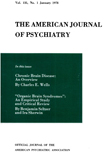ATROPINE TOXICITY IN THE TREATMENT OF MENTAL DISEASE
Abstract
The effect of repeated administrations of 32 mgms. of atropine sulfate to 183 unselected mentally ill patients has been studied. There was one death in this series. One hundred and fifty-four of these cases have been statistically analysed. Five to six months following the termination of therapy the following was found:
Sixteen percent of all patients were on convalescent status, markedly improved. Sixty percent of all neurotic patients were on convalescent status, markedly improved. Twenty percent of all catatonic schizophrenic patients were on convalescent status, markedly improved. Twenty-three percent of all manic-depressive patients, manic phase, were on convalescent status markedly improved. Eleven percent of all paranoid schizophrenic patients were on convalescent status, improved.
It is apparent that toxic doses of atropine sulfate are necessary to be therapeutically effective. Further investigation into pharmacotoxic therapy with other drug agents appears to be a promising field for research.
Access content
To read the fulltext, please use one of the options below to sign in or purchase access.- Personal login
- Institutional Login
- Sign in via OpenAthens
- Register for access
-
Please login/register if you wish to pair your device and check access availability.
Not a subscriber?
PsychiatryOnline subscription options offer access to the DSM-5 library, books, journals, CME, and patient resources. This all-in-one virtual library provides psychiatrists and mental health professionals with key resources for diagnosis, treatment, research, and professional development.
Need more help? PsychiatryOnline Customer Service may be reached by emailing [email protected] or by calling 800-368-5777 (in the U.S.) or 703-907-7322 (outside the U.S.).



